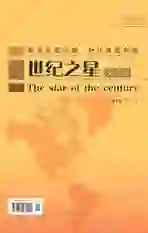小议情态动词的推测意义
2016-04-20苏永兰
苏永兰
情态动词是英语动词中最难把握的一类,也是各种考试中的常考知识点。这里,我们主要分析总结一下情态动词的推测意义和用法,包括对现在或将来以及过去情况的推测,帮助同学们提高英语的综合运用能力,在各种考试中立于不败之地。
一、推测现在或将来
用一般式或进行式(can,may的一般式可以推测将来),
1.肯定推测:must/should/may/might/could 语气由强到弱:肯定、很可能、有可能、或许。
【注意】can表示推测,常用于否定句和疑问句中,而不用于肯定句;但could无此限制。
Put on your coat, or you may/might/could catch a cold. 穿上大衣吧,否则你可能会感冒。
He must be waiting for you in the classroom now. 他现在一定正在教室里等你。
He bought this sewing machine secondhand. It cant be that expensive. 他买了这个二手的缝纫机;它不可能那么贵。
There shouldnt be any problem. 不会有什么问题。
【典题】
(2014湖北)Sometimes it may be helpful to use examples to explain abstract concepts. 有时候用例子来解释抽象的概念也许是有帮助的。
【注意】can后面有时可接“系动词(be, get, seem, become…)+形容词”,表示可能出现某种现象。
He is friendly, but sometimes he can be difficult to get along with.他挺友好的,但有时候很难相处。
【典题】
(2014大纲)Although you can find bargains in London, its not generally a cheap place to shop. 尽管你有时可能会在伦敦发现便宜货,但通常来说,这并非是一个购物的便宜去处。
2.否定推测:cant/couldnt/shouldnt/may not/might not 语气由强到弱:不可能、按说应该不、可能不
He can't/couldnt be working at this hour! 这个时候他不可能在工作!
He may/might not be in the classroom now. 他现在可能不在教室。
【典题】
(2013安徽)It couldnt be the vocabulary that caused you the problem in the exercise because you know a lot of words. 在练习中不可能是词汇给你造成了这个问题,因为你认识很多单词。
【考点】“cant / couldnt do ”+比较级”表示最高级意义
(2013天津)No one could be more generous; he has a heart of gold. 没有人会比他更慷慨;他有一颗金子般的心。
3.疑问句中的推测:can/could (may/might, 通常用于肯定句否定句、不用于疑问句)
单句改错:
—Tom is never late for work. Why is he absent today? 汤姆上班从来不迟到。他今天怎么没来呢?
—May anything have happened to him? 会有可能发生什么事了吗?
【答案】May改成Can/Could。
二、推测过去
推测过去发生过的动作要用完成式。
1.肯定推测:must/should/could/may/might have done 语气由强到弱:肯定、应该、可能、或许做过
I didnt hear the phone. I must have been asleep. 我没听到电话。我一定是睡着了。
He should have arrived at the airport by now. 这个时候他应该已经到机场了。
I cant find my keys. I may/might/could have left them at the school yesterday. 我找不到钥匙了。我可能昨天忘在学校了。
【典题】
(2013辽宁) Harry is feeling uncomfortable. He must have drunk too much at the party last night. Harry感觉不舒服。他肯定喝多了。
(2013新课标II)Since nobody gave him any help, he must have done the research on his own. 既然没有人给他任何帮助,那他肯定是自己做的调查。
2.否定推测:cant/couldnt/shouldnt/may/might have done 语气由强到弱:不可能、不应该、可能没做过
We knew he couldnt have paid for it, because he had no money. 我们知道他不可能付款了,因为他没钱。
【典题】
(2013四川)—Why are your eyes so red? You cant have slept well last night. 你的眼睛为什么这么红?你昨晚不可能睡得好。
—Yeah, I stayed up late writing a report. 嗯,我昨晚熬夜写报告了。
【考点】“cant/couldnt have done + 比较级”表示最高级意义
(2013浙江) I couldnt have enjoyed myself more—it was a perfect day. 我不可能玩的更开心了——这是很完美的一天。
3.疑问句中的推测:can/could have done(may/might, 通常用于肯定句否定句、不用于疑问句)
—Can they have missed the bus? —Yes, they may have. 他们有可能错过了那辆车了吗?是的,可能是。
【典题】
(2014陕西) My book, The House of Hales, is missing. Who could have taken it? 我的书《The House of Hales》不见了,可能是谁拿走了它呢?
【补充】could have done还表示对所发生的情况感到惊奇,含有“竟然”的意味
It seems inconceivable that the accident could have happened so quickly. 这一事故发生得这么快,简直不可思议。(惊讶)
